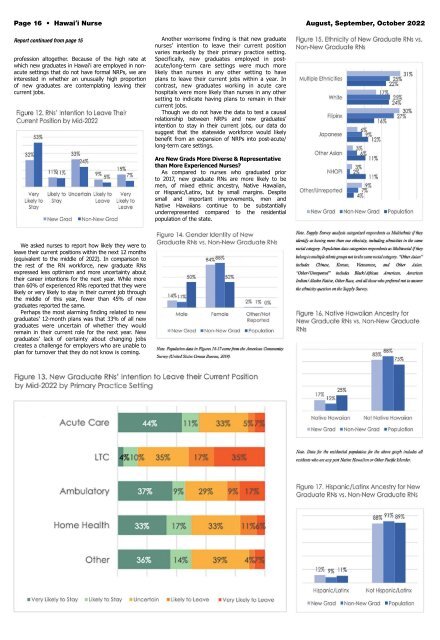The Hawai'i Nurse - August 2022
You also want an ePaper? Increase the reach of your titles
YUMPU automatically turns print PDFs into web optimized ePapers that Google loves.
Page 16 • Hawaiʻi <strong>Nurse</strong> <strong>August</strong>, September, October <strong>2022</strong><br />
Report continued from page 15<br />
profession altogether. Because of the high rate at<br />
which new graduates in Hawai‘i are employed in nonacute<br />
settings that do not have formal NRPs, we are<br />
interested in whether an unusually high proportion<br />
of new graduates are contemplating leaving their<br />
current jobs.<br />
Another worrisome finding is that new graduate<br />
nurses’ intention to leave their current position<br />
varies markedly by their primary practice setting.<br />
Specifically, new graduates employed in postacute/long-term<br />
care settings were much more<br />
likely than nurses in any other setting to have<br />
plans to leave their current jobs within a year. In<br />
contrast, new graduates working in acute care<br />
hospitals were more likely than nurses in any other<br />
setting to indicate having plans to remain in their<br />
current jobs.<br />
Though we do not have the data to test a causal<br />
relationship between NRPs and new graduates’<br />
intention to stay in their current jobs, our data do<br />
suggest that the statewide workforce would likely<br />
benefit from an expansion of NRPs into post-acute/<br />
long-term care settings.<br />
Are New Grads More Diverse & Representative<br />
than More Experienced <strong>Nurse</strong>s?<br />
As compared to nurses who graduated prior<br />
to 2017, new graduate RNs are more likely to be<br />
men, of mixed ethnic ancestry, Native Hawaiian,<br />
or Hispanic/Latinx, but by small margins. Despite<br />
small and important improvements, men and<br />
Native Hawaiians continue to be substantially<br />
underrepresented compared to the residential<br />
population of the state.<br />
We asked nurses to report how likely they were to<br />
leave their current positions within the next 12 months<br />
(equivalent to the middle of <strong>2022</strong>). In comparison to<br />
the rest of the RN workforce, new graduate RNs<br />
expressed less optimism and more uncertainty about<br />
their career intentions for the next year. While more<br />
than 60% of experienced RNs reported that they were<br />
likely or very likely to stay in their current job through<br />
the middle of this year, fewer than 45% of new<br />
graduates reported the same.<br />
Perhaps the most alarming finding related to new<br />
graduates’ 12-month plans was that 33% of all new<br />
graduates were uncertain of whether they would<br />
remain in their current role for the next year. New<br />
graduates’ lack of certainty about changing jobs<br />
creates a challenge for employers who are unable to<br />
plan for turnover that they do not know is coming.
















